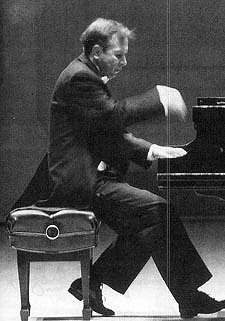These were concerts to See and Hear; to savour live, think about and remember for long afterwards. They were the better for there being no forest of radio microphones or TV cameras to distract; the communion, which engaged eyes fully as ears, was contained within the auditorium space.
This Beethoven piano concerto cycle in three evenings began with Strauss in sombre mood, his reference to the Beethoven Eroica adagio in Metamorphosen: study for 23 solo strings making for a tenuous thematic link. A description of this 'sustained symphonic adagio' as 'the saddest piece of music ever written' was copied into the programme notes; a threnody, perhaps, for the destruction of Dresden & Munich towards the end of the War, an 'elegy for the death of German culture' (Wendy Thompson).
I had never seen Metamorphosen played live as originally intended, and would not again wish it other. It was engrossing to watch the subtle intermingling of the strands in their many groupings. Christoph von Dohnanyi maintained a forward thrust, not really an adagio feel, which I found continually engaging and uplifting. From Row S of the stalls the sound, though modest in decibel count, was sonorous and full, more so than it looked likely to be, a testimony to Strauss' profound knowledge of all the orchestral instruments. Bartok's Divertimento in the second concert engaged me less, and its solo string quartet sounded thin within larger string orchestral forces.
I had wished Metamorphosen had been placed before the interval on 4 November, and wondered how Beethoven's earliest concerto, No 2, could possibly follow it immediately. In fact, it had served to draw the audience in, and helped to prepare ears for the super-subtleties of Pletnev's piano playing. Dohnanyi established at once a quality of tone and balance which augured well for their association, and he proved wonderfully attuned to Pletnev, never encouraging the orchestra to a show of strength.
Mikhail Pletnev was fascinating to watch and often signalled surprises with his body language. In the first concert, his languid walk to the piano and curt, almost dismissive acknowledgment of the audience preceded a unique 'throw-away' treatment of the famous solo statement which precedes the orchestral tutti in No 4, often treated to an intense portentousness, but here thrown away as if he was just checking up on the instrument, for himself, not really speaking to us yet. Before No 3, he sat down and immediately played a single chord, as if greeting his piano with a handshake, defusing at a stroke the cumulative tension that often builds up during long a orchestral introduction before the soloist join the fray.
As with his treatment of Tchaikovsky in last year's concert cycle at RFH, when he accompanied the orchestra with the famous introductory chords of No 1 like a baroque violinist playing himself in during an orchestral ritornello, Pletnev draws you in by stealth, instead of trying to pit himself against an orchestra - an unequal contest in live concert situations - though in the second concert some reserves of power were revealed in No 3, which inhabited very different territory from No 1 before the interval.
Acclaimed by all, these performances will have spoken differently to different listeners. One was heard to admire 'a fine pianist, so simple'! For pianists and experienced pianophiles Pletnev is not so. His basic posture is with low wrists, which can augur well, and the over-riding hallmark is his command of physical relaxation - I would not be surprised to learn that he did not feel particularly tired after his double exertions. Every entry, indeed every phrase, was individually characterised, in his responses to the orchestra, sometimes inwardly communing, at others playful, the finale of No 1 racing away to show he can rival any speedster, that of No 3 taken at a comfortable tempo to accommodate the humour it contains, despite Beethoven's dire personal circumstances with increasing deafness, soon after the Heiligenstadt Testament. And most importantly of all, the variety of touch and pedalling colouring Pletnev's passage work, which was never over-inflated in significance, a lexicon of degrees of legato and non-legato at his easy command.
Pletnev has not yet recorded the Beethoven concertos. What chance, when he does, of so judicious a balance (rare in concerto recordings) as achieved in his Tchaikovsky CDs for Virgin? To hear Pletnev's virtuosity of touch, not of velocity, try his way with Grieg Lyric Pieces and, for a Beethoven foretaste, a revealing Op 111 in his astonishing Carnegie Hall debut recital, both on Deutsche Grammophon.
Peter Grahame Woolf

 Return to:
Return to: